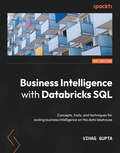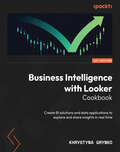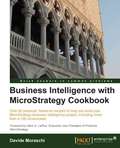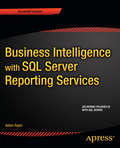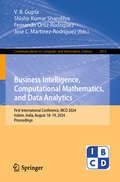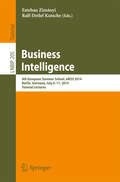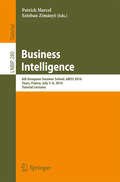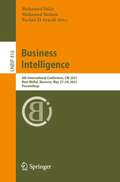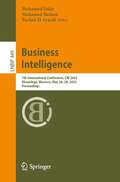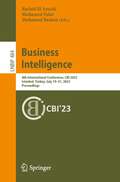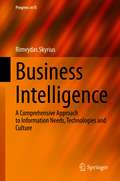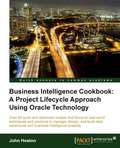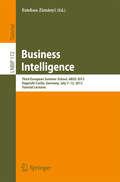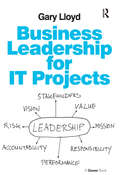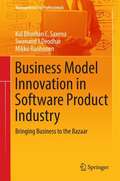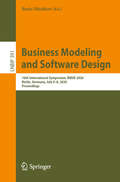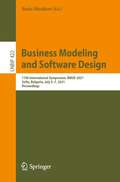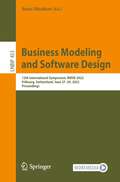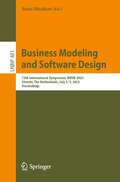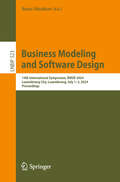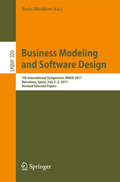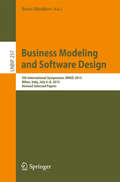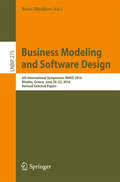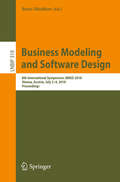- Table View
- List View
Business Intelligence with Databricks SQL: Concepts, tools, and techniques for scaling business intelligence on the data lakehouse
by Vihag GuptaMaster critical skills needed to deploy and use Databricks SQL and elevate your BI from the warehouse to the lakehouse with confidenceKey FeaturesLearn about business intelligence on the lakehouse with features and functions of Databricks SQLMake the most of Databricks SQL by getting to grips with the enablers of its data warehousing capabilitiesA unique approach to teaching concepts and techniques with follow-along scenarios on real datasetsBook DescriptionIn this new era of data platform system design, data lakes and data warehouses are giving way to the lakehouse – a new type of data platform system that aims to unify all data analytics into a single platform. Databricks, with its Databricks SQL product suite, is the hottest lakehouse platform out there, harnessing the power of Apache Spark™, Delta Lake, and other innovations to enable data warehousing capabilities on the lakehouse with data lake economics. This book is a comprehensive hands-on guide that helps you explore all the advanced features, use cases, and technology components of Databricks SQL. You'll start with the lakehouse architecture fundamentals and understand how Databricks SQL fits into it. The book then shows you how to use the platform, from exploring data, executing queries, building reports, and using dashboards through to learning the administrative aspects of the lakehouse – data security, governance, and management of the computational power of the lakehouse. You'll also delve into the core technology enablers of Databricks SQL – Delta Lake and Photon. Finally, you'll get hands-on with advanced SQL commands for ingesting data and maintaining the lakehouse. By the end of this book, you'll have mastered Databricks SQL and be able to deploy and deliver fast, scalable business intelligence on the lakehouse.What you will learnUnderstand how Databricks SQL fits into the Databricks Lakehouse PlatformPerform everyday analytics with Databricks SQL Workbench and business intelligence toolsOrganize and catalog your data assetsProgram the data security model to protect and govern your dataTune SQL warehouses (computing clusters) for optimal query experienceTune the Delta Lake storage format for maximum query performanceDeliver extreme performance with the Photon query execution engineImplement advanced data ingestion patterns with Databricks SQLWho this book is forThis book is for business intelligence practitioners, data warehouse administrators, and data engineers who are new to Databrick SQL and want to learn how to deliver high-quality insights unhindered by the scale of data or infrastructure. This book is also for anyone looking to study the advanced technologies that power Databricks SQL. Basic knowledge of data warehouses, SQL-based analytics, and ETL processes is recommended to effectively learn the concepts introduced in this book and appreciate the innovation behind the platform.
Business Intelligence with Looker Cookbook: Create BI solutions and data applications to explore and share insights in real time
by Khrystyna GrynkoUse Looker for visualizing data, data analysis, and reporting, and learn how to connect to your data, build dashboards and reports, and share insights with your teamKey FeaturesExplore data visualization, analysis, and reporting with Looker to gain insights from your dataConnect to data sources, build dashboards, and create reports to track and share key metricsShare insights with your team to make better business decisionsPurchase of the print or Kindle book includes a free PDF eBookBook DescriptionLooker is a data analytics and business intelligence platform that allows organizations to explore, analyze, and visualize their data. It provides tools for data modeling, exploration, and visualization, enabling you to gain insights from your data to make informed business decisions. You’ll start with the basics, from setting up your Looker environments to configuring views and models using LookML. As you progress, you’ll delve into more advanced topics, such as navigating data in Explore, tailoring dashboards to your needs, and adding dynamic elements for interactivity. Along the way, you'll gain invaluable troubleshooting skills to tackle common issues and optimize your Looker usage, ensuring a smooth and seamless experience. Furthermore, the book extends your understanding beyond the basics, equipping you with the knowledge you need to develop Looker applications and seamlessly integrate them with other tools and applications. You'll also explore advanced techniques for harnessing Looker's full potential, empowering you to establish data-driven decision-making and innovation within your organization. By the end of this BI book, you'll have gained a solid understanding of how to use Looker to find important information, make tasks easier, and derive important insights.What you will learnUnderstand Looker's key components, including LookML, data models, and dashboards.Explore Looker's functionality, including custom fields, calculations, and visualizations.Work with Looker dashboards using dynamic elements like links and actions.Use different types of filters for dimensions to create dashboardsDevelop Looker applications using essential tools and frameworksExplore additional applications for the Looker organizationIntegrate Looker with other tools using APIs, connectors, and data pipelinesWho this book is forIf you’re a business analyst, data analyst, or BI developer who wants to get well-versed with the features of Looker, this book is for you. Basic knowledge of business intelligence is required to get started.
Business Intelligence with MicroStrategy Cookbook
by Davide MoraschiWritten in a cookbook style, this book will teach you through the use of recipes with examples and illustrations. Each recipe contains step-by-step instructions about everything necessary to execute a particular task.This book is intended for both BI and database developers who want to expand their knowledge of MicroStrategy. It is also useful for advanced data analysts who are evaluating different technologies. You do not need to be an SQL master to read this book, yet knowledge of some concepts like foreign keys and many-to-many relationships is assumed. Some knowledge of basic concepts such as dimensional modeling (fact tables, dimensions) will also help your comprehension of this book. No previous MicroStrategy knowledge is needed.
Business Intelligence with SQL Server Reporting Services
by Adam AspinBusiness Intelligence with SQL Server Reporting Services helps you deliver business intelligence with panache. Harness the power of the Reporting Services toolkit to combine charts, gauges, sparklines, indicators, and maps into compelling dashboards and scorecards. Create compelling visualizations that seize your audience's attention and help business users identify and react swiftly to changing business conditions. Best of all, you'll do all these things by creating new value from software that is already installed and paid for - SQL Server and the included SQL Server Reporting Services. Businesses run on numbers, and good business intelligence systems make the critical numbers immediately and conveniently accessible. Business users want access to key performance indicators in the office, at the beach, and while riding the subway home after a day's work. Business Intelligence with SQL Server Reporting Services helps you meet these need for anywhere/anytime access by including chapters specifically showing how to deliver on modern devices such as smart phones and tablets. You'll learn to deliver the same information, with similar look-and-feel, across the entire range of devices used in business today. Key performance indicators give fast notification of business unit performancePolished dashboards deliver essential metrics and strategic comparisonsVisually arresting output on multiple devices focuses attention
Business Intelligence, Computational Mathematics, and Data Analytics: First International Conference, IBCD 2024, Indore, India, August 18–19, 2024, Proceedings (Communications in Computer and Information Science #2413)
by Shishir Kumar Shandilya Fernando Ortiz-Rodríguez V. B. Gupta Jose L. Martinez-RodriguezThis book constitutes the proceedings of the First International Conference on Business Intelligence, Computational Mathematics, and Data Analytics, IBCD 2024, held in Indore, India, during August 18–19, 2024. The conference focus on applied intelligence across data science, mathematics, healthcare, cybersecurity, and business analytics, and will serve as a driving force for transforming theoretical breakthroughs into practical, real-world solutions with meaningful societal impact.
Business Intelligence: 4th European Summer School, eBISS 2014, Berlin, Germany, July 6-11, 2014, Tutorial Lectures (Lecture Notes in Business Information Processing #205)
by Esteban Zimányi Ralf-Detlef KutscheThis book constitutes the tutorial lectures of the 4th European Business Intelligence Summer School, eBISS 2014, held in Berlin, Germany, in July 2014. The tutorials presented here in an extended and refined format were given by renowned experts and cover topics including requirements engineering for decision-support systems, visual analytics of large data sets, linked data and semantic technologies, supervised classification on data streams, and knowledge reuse in large organizations.
Business Intelligence: 6th European Summer School, eBISS 2016, Tours, France, July 3-8, 2016, Tutorial Lectures (Lecture Notes in Business Information Processing #280)
by Esteban Zimányi Patrick MarcelBusiness Intelligence (BI) promises an organization the capability of collecting and analyzing internal and external data to generate knowledge and value, providing decision support at the strategic, tactical, and operational levels. Business Intelligence is now impacted by the Big Data phenomena and the evolution of society and users, and needs to take into account high-level semantics, reasoning about unstructured and structured data, and to provide a simplified access and better understanding of diverse BI tools accessible trough mobile devices. In particular, BI applications must cope with additional heterogeneous (often Web-based) sources, e. g. , from social networks, blogs, competitors', suppliers', or distributors' data, governmental or NGO-based analysis and papers, or from research publications. The lectures held at the First European Business Intelligence Summer School (eBISS), which are presented here in an extended and refined format, cover not only established BI technologies like data warehouses, OLAP query processing, or performance issues, but extend into new aspects that are important in this new environment and for novel applications, e. g. , semantic technologies, social network analysis and graphs, services, large-scale management, or collaborative decision making. Combining papers by leading researchers in the field, this volume will equip the reader with the state-of-the-art background necessary for inventing the future of BI. It will also provide the reader with an excellent basis and many pointers for further research in this growing field.
Business Intelligence: 6th International Conference, CBI 2021, Beni Mellal, Morocco, May 27–29, 2021, Proceedings (Lecture Notes in Business Information Processing #416)
by Mohamed Fakir Mohamed Baslam Rachid El AyachiThis book constitutes the proceedings of the 6th International Conference on Business Intelligence, CBI 2021, which took place in Beni Mellal, Morocco, during May 27-29, 2021.The 26 full and 6 poster papers included in this book were carefully reviewed and selected from a total of 60 submissions. They were organized in topical sections as follows: decision support, information systems and NLP; big data, datamining, Web services and Web semantics; optimization and decision support; signal, image and vision computing; networking, cloud computing and networking architectures in cloud.
Business Intelligence: 7th International Conference, CBI 2022, Khouribga, Morocco, May 26–28, 2022, Proceedings (Lecture Notes in Business Information Processing #449)
by Mohamed Fakir Mohamed Baslam Rachid El AyachiThis book constitutes the proceedings of the 7th International Conference on Business Intelligence, CBI 2022, which took place in Khouribga, Morocco, during May 26-28, 2022. The 23 full papers included in this book were carefully reviewed and selected from a total of 68 submissions. They were organized in topical sections as follows: decision support and artificial intelligence; business intelligence and database; and optimization and dynamic programming.
Business Intelligence: 8th International Conference, CBI 2023, Istanbul, Turkey, July 19–21, 2023, Proceedings (Lecture Notes in Business Information Processing #484)
by Mohamed Fakir Mohamed Baslam Rachid El AyachiThis book constitutes the refereed proceedings of the 8th International Conference on Business Intelligence, CBI 2023, which held in Istanbul, Turkey, during July 19–21, 2023.The 15 full papers included in this book were carefully reviewed and selected from 50 submissions. They were organized in topical sections as follows: artificial intelligence and business intelligence; and optimization and decision support.
Business Intelligence: A Comprehensive Approach to Information Needs, Technologies and Culture (Progress in IS)
by Rimvydas SkyriusThis book examines the managerial dimensions of business intelligence (BI) systems. It develops a set of guidelines for value creation by implementing business intelligence systems and technologies. In particular the book looks at BI as a process – driven by a mix of human and technological capabilities – to serve complex information needs in building insights and providing aid in decision making. After an introduction to the key concepts of BI and neighboring areas of information processing, the book looks at the complexity and multidimensionality of BI. It tackles both data integration and information integration issues. Bodies of knowledge and other widely accepted collections of experience are presented and turned into lessons learned. Following a straightforward introduction to the processes and technologies of BI the book embarks on BI maturity and agility, the components, drivers and inhibitors of BI culture and soft BI factors like attention, sense and trust. Eventually the book attempts to provide a holistic view on business intelligence, possible structures and tradeoffs and embarks to provide an outlook on possible developments in BI and analytics.
Business Intelligence: A Project Lifecycle Approach Using Oracle Technology Cookbook
by John HeatonThis book is written in a simple, easy to understand format with lots of screenshots and step-by-step explanations. If you are Project Managers or IT professionals looking to design and develop a data warehouse and business intelligence solution, then this is the best guide for you. This book assumes that you have a fundamental knowledge of data warehouse and business intelligence projects.
Business Intelligence: Third European Summer School, eBISS 2013, Dagstuhl Castle, Germany, July 7-12, 2013, Tutorial Lectures (Lecture Notes in Business Information Processing #172)
by Esteban ZimányiTo large organizations, business intelligence (BI) promises the capability of collecting and analyzing internal and external data to generate knowledge and value, thus providing decision support at the strategic, tactical, and operational levels. BI is now impacted by the "Big Data" phenomena and the evolution of society and users. In particular, BI applications must cope with additional heterogeneous (often Web-based) sources, e. g. , from social networks, blogs, competitors', suppliers', or distributors' data, governmental or NGO-based analysis and papers, or from research publications. In addition, they must be able to provide their results also on mobile devices, taking into account location-based or time-based environmental data. The lectures held at the Third European Business Intelligence Summer School (eBISS), which are presented here in an extended and refined format, cover not only established BI and BPM technologies, but extend into innovative aspects that are important in this new environment and for novel applications, e. g. , pattern and process mining, business semantics, Linked Open Data, and large-scale data management and analysis. Combining papers by leading researchers in the field, this volume equips the reader with the state-of-the-art background necessary for creating the future of BI. It also provides the reader with an excellent basis and many pointers for further research in this growing field.
Business Leadership for IT Projects
by Gary LloydThe track record of IT projects is poor. Less than a third of IT projects deliver what they said they would, on schedule and on budget. The major cause of IT project failure is not, as you might expect, poor IT leadership or difficult technology but poor business leadership. One of the reasons for this is that, unlike their IT peers, business managers often get little training or education in project delivery, let alone the special case represented by an IT project. Business Leadership for IT Projects addresses the gap by providing tools and ideas that are applicable to all sizes of IT projects, from those in large multinational corporations, down to small growing businesses. It sets out the key project touchpoints where business leadership can have a major impact on project success. The book combines psychological research and project best practice to create a practical toolbox that can be dipped into, as needs arise, or followed as an overall approach to IT project leadership. The toolbox weaves together three key strands of thought. First, that the concept of value should be at the forefront of project design and delivery. Second, that business managers need to take active leadership of IT projects to secure value. Third, that project teams need tools to slow down their thinking and ensure that actions and decisions are well thought through.
Business Math Using Excel: 2nd + Cengagenow Printed Access Card (Fbla - All Ser.)
by Sharon Burton Nelda SheltonNIMAC-sourced textbook
Business Model Innovation in Software Product Industry
by Kul Bhushan C. Saxena Swanand J. Deodhar Mikko RuohonenThis book examines the current massive changes in the software product industry on the basis of business model changes affecting six software products, and proposes a generic framework for business model innovation. Due to the combined effects of globalization, new market expectations and IT consumerization, the software industry has been experiencing a period of fundamental and rapid change. Achieving agility and the ability to innovate has now become vital, thus forcing organizations to create immense potential for innovating their business models. Proprietary and open source software (OSS) licensing represent the two extreme ends of the spectrum that could be used to build the business model of a software product. Given the changed face of the software product industry, successful software product vendors are innovating their business models by adopting a variety of combinations of these unilateral and new business models. However, these innovations also pose a number of challenges. The book examines these challenges in the context of several software product case studies in which companies successfully (or in some cases, less successfully) met these challenges and changed their business models. Focusing on the major issues related to business models in the software product industry, the book is targeted for a variety of readers: software entrepreneurs/start-ups, software product industry professionals, academics and students. Though the industry and technologies are changing rapidly, the issues addressed here are fundamental and will remain important ones for the foreseeable future.
Business Modeling and Software Design: 10th International Symposium, BMSD 2020, Berlin, Germany, July 6-8, 2020, Proceedings (Lecture Notes in Business Information Processing #391)
by Boris ShishkovThis book constitutes the refereed proceedings of the 10th International Symposium on Business Modeling and Software Design, BMSD 2020, which took place in Berlin, Germany, in July 2020. BMSD is a leading international forum that brings together researchers and practitioners interested in business modeling and its relation to software design. Particular areas of interest are: Business Processes and Enterprise Engineering; Business Models and Requirements; Business Models and Services; Business Models and Software; Information Systems Architectures and Paradigms; Data Aspects in Business Modeling and Software Development; Blockchain-Based Business Models and Information Systems; IoT and Implications for Enterprise Information Systems. The theme of BMSD 2020 was: Towards Knowledge-Driven Enterprise Information Systems.
Business Modeling and Software Design: 11th International Symposium, BMSD 2021, Sofia, Bulgaria, July 5–7, 2021, Proceedings (Lecture Notes in Business Information Processing #422)
by Boris ShishkovThis book constitutes the refereed proceedings of the 11th International Symposium on Business Modeling and Software Design, BMSD 2021, which took place in Sofia, Bulgaria, in July 2021.The 14 full and 13 short papers included in this book were carefully reviewed and selected from a total of 61 submissions. BMSD is a leading international forum that brings together researchers and practitioners interested in business modeling and its relation to software design. Particular areas of interest are: Business Processes and Enterprise Engineering; Business Models and Requirements; Business Models and Services; Business Models and Software; Information Systems Architectures and Paradigms; Data Aspects in Business Modeling and Software Development; Blockchain-Based Business Models and Information Systems; IoT and Implications for Enterprise Information Systems. The BMSD 2021 theme was: Towards Enterprises and Software that are Resilient against Disruptive Events.
Business Modeling and Software Design: 12th International Symposium, BMSD 2022, Fribourg, Switzerland, June 27–29, 2022, Proceedings (Lecture Notes in Business Information Processing #453)
by Boris ShishkovThis book constitutes the refereed proceedings of the 12h International Symposium on Business Modeling and Software Design, BMSD 2022, which took place in Fribourg, Switzerland, in June 2022.The 12 full and 9 short papers included in this book were carefully reviewed and selected from a total of 56 submissions. BMSD is a leading international forum that brings together researchers and practitioners interested in business modeling and its relation to software design. Particular areas of interest are: Business Processes and Enterprise Engineering; Business Models and Requirements; Business Models and Services; Business Models and Software; Information Systems Architectures and Paradigms; Data Aspects in Business Modeling and Software Development; Blockchain-Based Business Models and Information Systems; IoT and Implications for Enterprise Information Systems. Each year, a special theme is chosen, for making presentations and discussions more focused. The BMSD 2022 theme is: Information Systems Engineering and Trust.
Business Modeling and Software Design: 13th International Symposium, BMSD 2023, Utrecht, The Netherlands, July 3–5, 2023, Proceedings (Lecture Notes in Business Information Processing #483)
by Boris ShishkovThis book constitutes the refereed proceedings of the 13h International Symposium on Business Modeling and Software Design, BMSD 2023, which took place in Utrecht, The Netherlands, July 2023.The 11 full and 18 short papers included in this book were carefully reviewed and selected from a total of 65 submissions. BMSD is a leading international forum that brings together researchers and practitioners interested in business modeling and its relation to software design. Particular areas of interest are: Business Processes and Enterprise Engineering, Business Models and Requirements, Business Models and Services, Business Models and Software, Information Systems Architectures and Paradigms, Data Aspects in Business Modeling and Software Development, Blockchain-Based Business Models and Information Systems, Iot and Implications for Enterprise Information Systems. Each year, a special theme is chosen, for making presentations and discussions more focused. The BMSD 2023 theme is: Incorporating Context Awareness in the Design of Information Systems.
Business Modeling and Software Design: 14th International Symposium, BMSD 2024, Luxembourg City, Luxembourg, July 1–3, 2024, Proceedings (Lecture Notes in Business Information Processing #523)
by Boris ShishkovThis book constitutes the refereed proceedings of the 14h International Symposium on Business Modeling and Software Design, BMSD 2024, which took place in Luxembourg, during July 1-3, 2024. The 13 full and 7 short papers included in this book were carefully reviewed and selected from a total of 54 submissions. BMSD is a leading international forum that brings together researchers and practitioners interested in business modeling and its relation to software design. Particular areas of interest are: Business Processes and Enterprise Engineering, Business Models and Requirements, Business Models and Services, Business Models and Software, Information Systems Architectures and Paradigms, Data Aspects in Business Modeling and Software Development, Blockchain-Based Business Models and Information Systems, IoT and Implications for Enterprise Information Systems. Each year, a special theme is chosen, for making presentations and discussions more focused, and in 2024 it is: Towards Socially Responsible Information Systems.
Business Modeling and Software Design: 4th International Symposium, Bmsd 2014, Luxembourg, Luxembourg, June 24-26, 2014, Revised Selected Papers (Lecture Notes In Business Information Processing #220)
by Boris ShishkovThis book contains revised and extended versions of selected papers from the 7th International Symposium on Business Modeling and Software Design, BMSD 2017, held in Barcelona, Spain, in July 2017. BMSD 2017 received a total of 57 paper submissions. The 10 papers selected for inclusion in this book deal with topics such as: business processes and enterprise engineering; business models and requirements; business models and services; business models and software; information systems architectures and paradigms; and data aspects in business modeling and software development.
Business Modeling and Software Design: 5th International Symposium, BMSD 2015, Milan, Italy, July 6–8, 2015, Revised Selected Papers (Lecture Notes in Business Information Processing #257)
by Boris ShishkovThis book contains the extended and revised versions of selected papers from the 4th International Symposium on Business Modeling and Software Design, BMSD 2014, held in Luxembourg, Luxembourg, in June 2014. The symposium was organized and sponsored by the Interdisciplinary Institute for Collaboration and Research on Enterprise Systems and Technology (IICREST), in collaboration with the Public Research Centre Henri Tudor (TUDOR). Cooperating organizations were the Dutch Research School for Information and Knowledge Systems (SIKS), Aristotle University of Thessaloniki (AUTH), the UTwente Center for Telematics and Information Technology (CTIT), and AMAKOTA Ltd. The 37 papers presented at BMSD 2014 were selected from 52 submissions. The seven papers published in this book were carefully reviewed, selected, revised, and extended from the presented papers. The selection considers a large number of BMSD-relevant research topics: from modeling and simulation-related subjects, such as declarative business rules, business (process) modeling, business process simulation, and information systems modeling, through architectures-related areas, such as impact analysis with regard to enterprise architectures and architectural principles for service cloud applications, to topics touching upon quality-of-service-aware service systems.
Business Modeling and Software Design: 6th International Symposium, BMSD 2016, Rhodes, Greece, June 20-22, 2016, Revised Selected Papers (Lecture Notes in Business Information Processing #275)
by Boris ShishkovThis book contains revised and extended versions of selected papers from the Fifth International Symposium on Business Modeling and Software Design, BMSD 2015, held in Milan, Italy, in July 2015. The symposium was organized and sponsored by the Interdisciplinary Institute for Collaboration and Research on Enterprise Systems and Technology (IICREST), being co-organized by Politecnico di Milano and technically co-sponsored by BPM-D. Cooperating organizations were Aristotle University of Thessaloniki (AUTH), the U Twente Center for Telematics and Information Technology (CTIT), the BAS Institute of Mathematics and Informatics (IMI), the Dutch Research School for Information and Knowledge Systems (SIKS), and AMAKOTA Ltd. BMSD 2015 received 57 paper submissions from which 36 papers were selected for publication in the BMSD'15 proceedings. 14 of those papers were selected as full papers. Additional post-symposium reviewing was carried out reflecting both the qualities of the papers and the way they were presented. 10 best papers were selected for the Springer edition (mainly from the BMSD'15 full papers). The 10 papers published in this book were carefully revised and extended (following the reviewers' comments) from the papers presented. The selection considers a large number of BMSD-relevant research topics: from business-processes-related topics, such as process mining and discovery, (dynamic) business process management (and process-aware information systems), and business process models and ontologies (including reflections into the Business Model Canvas); through software-engineering-related topics, such as domain-specific languages and software quality (and technical debt); and semantics-related topics, such as semantic technologies and knowledge management (and knowledge identification); to topics touching upon cloud computing and IT-enabled capabilities for enterprises.
Business Modeling and Software Design: 8th International Symposium, BMSD 2018, Vienna, Austria, July 2-4, 2018, Proceedings (Lecture Notes in Business Information Processing #319)
by Boris ShishkovThis book constitutes the proceedings of the 8th International Symposium on Business Modeling and Software Design, BMSD 2018, held in Vienna, Austria, in July 2018. The 14 full papers and 21 short papers selected for inclusion in this book deal with a large number of research topics: (i) Some topics concern Business Processes (BP), such as BP modeling / notations / visualizations, BP management, BP variability, BP contracting, BP interoperability, BP modeling within augmented reality, inter-enterprise collaborations, and so on; (ii) Other topics concern Software Design, such as software ecosystems, specification of context-aware software systems, service-oriented solutions and micro-service architectures, product variability, software development monitoring, and so on; (iii) Still other topics are crosscutting with regard to business modeling and software design, such as data analytics as well as information security and privacy; (iv) Other topics concern hot technology / innovation areas, such as blockchain technology and internet-of-things. Underlying with regard to all those topics is the BMSD’18 theme: Enterprise Engineering and Software Engineering - Processes and Systems for the Future.
